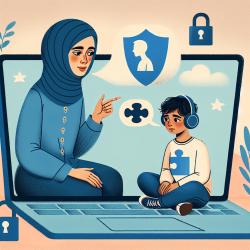The COVID-19 pandemic has had profound effects on various aspects of life, including the delivery of therapeutic services to autistic children. A recent study titled "The Impacts of the COVID-19 Pandemic on Therapy Utilization Among Racially/Ethnically and Socio-Economically Diverse Autistic Children" offers critical insights into how therapy utilization was affected during the pandemic. This blog aims to distill key findings from the study and provide actionable recommendations for practitioners.
Key Findings
The study analyzed data from 283 autistic children receiving Applied Behavior Analysis (ABA) therapy in California. The researchers segmented the timeline into three phases: pre-pandemic, crisis, and mitigation. Here are the primary findings:
- Therapy utilization decreased significantly during the crisis phase (March 2020 - May 2020) by an average of 10.65 hours per month.
- Utilization increased during the mitigation phase (June 2020 - February 2021) but did not return to pre-pandemic levels, with an average increase of 2.39 hours per month.
- Racial disparities were evident, with Asian children experiencing a slower recovery in therapy hours compared to white children.
- Children funded by school districts faced the most significant disruptions, losing more therapy hours during the crisis phase and experiencing a slower recovery.
Actionable Insights for Practitioners
Understanding these findings can help practitioners adapt and improve their service delivery. Here are some recommendations:
1. Implement Flexible Service Delivery Models
Teletherapy emerged as a critical tool during the pandemic. Practitioners should continue to refine teletherapy methods to ensure they are as effective as in-person sessions. This includes investing in technology and training for both therapists and families.
2. Address Racial and Socio-Economic Disparities
Practitioners should be aware of the disparities in therapy utilization and work towards creating more equitable access. This can include offering culturally and linguistically appropriate services and advocating for policy changes that ensure consistent funding and support for all children, regardless of their background.
3. Monitor and Adapt Therapy Plans
Regularly assess the effectiveness of therapy plans and make necessary adjustments. This is particularly important for children who experienced significant disruptions. Ensure that therapy goals are realistic and achievable, considering the ongoing challenges posed by the pandemic.
4. Engage Families as Partners
Family involvement is crucial for the success of therapy. Provide resources and support to help families facilitate therapy at home. This includes training parents on how to support their children's therapy goals and offering regular check-ins to address any concerns.
Encouraging Further Research
While this study provides valuable insights, there is a need for ongoing research to understand the long-term impacts of the pandemic on therapy utilization and outcomes for autistic children. Practitioners are encouraged to contribute to and stay updated with the latest research to continually improve their practice.
To read the original research paper, please follow this link: The Impacts of the COVID-19 Pandemic on Therapy Utilization Among Racially/Ethnically and Socio-Economically Diverse Autistic Children










